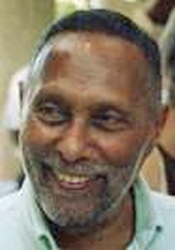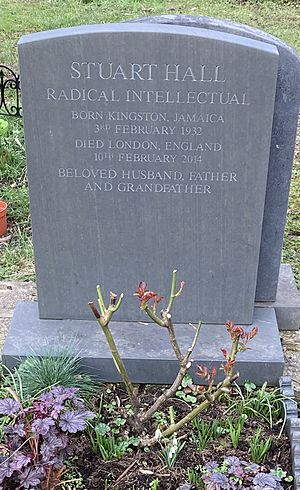Stuart Hall (cultural theorist) facts for kids
Quick facts for kids
Stuart Hall
|
|
|---|---|
 |
|
| Born |
Stuart Henry McPhail Hall
3 February 1932 Kingston, Jamaica
|
| Died | 10 February 2014 (aged 82) London, England
|
| Nationality | British |
| Alma mater | Merton College, Oxford |
| Known for | Founding New Left Review |
| Spouse(s) |
Catherine Hall
(m. 1964) |
| Scientific career | |
| Institutions | |
| Doctoral students | Paul Gilroy |
| Other notable students | Gregor McLennan |
| Influences | |
| Influenced |
|
Stuart Hall (born February 3, 1932 – died February 10, 2014) was a very important thinker from Jamaica. He became a British sociologist (someone who studies society) and a cultural studies expert. He also worked as a political activist, which means he worked to bring about social or political change.
Stuart Hall, along with Richard Hoggart and Raymond Williams, helped start a way of thinking called British Cultural Studies. This field looks at how culture, like TV shows, music, and fashion, connects with power and society.
In the 1950s, Hall helped create an important magazine called New Left Review. Later, in 1964, he joined the Centre for Contemporary Cultural Studies (CCCS) at Birmingham University. He became the director of the CCCS in 1972 and stayed there until 1979. While at the CCCS, Hall helped expand cultural studies to include topics like race and gender. He also brought in new ideas from French thinkers like Michel Foucault.
After leaving Birmingham, Hall became a professor at the Open University in 1979. He was also the President of the British Sociological Association from 1995 to 1997. He retired in 1997. Many people called him "one of the country's leading cultural theorists." Hall was also involved in the Black Arts Movement. Famous movie directors like John Akomfrah and Isaac Julien looked up to him.
Stuart Hall was married to Catherine Hall, who was also a professor. They had two children. After he passed away, many people said he was "one of the most influential intellectuals of the last sixty years."
Contents
Stuart Hall's Early Life and Education
Stuart Hall was born on February 3, 1932, in Kingston, Jamaica. He grew up in a middle-class family with mixed backgrounds, including African, English, and Portuguese Jewish roots. He went to Jamaica College, which taught students in a style similar to British schools.
Hall described himself as a "bright, promising scholar." He learned about many different writers and thinkers, like T. S. Eliot, James Joyce, Sigmund Freud, and Karl Marx. He also studied Caribbean literature. Growing up in colonial Jamaica, where skin color could affect how people were treated, deeply influenced his ideas later in life.
In 1951, Hall won a special scholarship called a Rhodes Scholarship. This allowed him to study English at Merton College, Oxford in England. He became part of the "Windrush generation," which was the first large group of people from the West Indies to move to Britain.
Hall started a PhD at Oxford but decided to stop in 1957 or 1958. He wanted to focus more on political work. This decision was influenced by events like the 1956 Soviet invasion of Hungary and the Suez Crisis. In 1957, he joined the Campaign for Nuclear Disarmament (CND), a group working against nuclear weapons. He met his future wife, Catherine Hall, on a CND march.
Starting the New Left Review
After working on a student magazine at Oxford, Stuart Hall joined E. P. Thompson and Raymond Williams to create the New Left Review in 1960. Hall was its first editor. This magazine became very important for discussing new left-wing ideas. He left the magazine's board in 1961 or 1962.
Work at Birmingham University
Stuart Hall's academic career really took off in 1964. He co-wrote a book called The Popular Arts, which was one of the first books to seriously study film as entertainment. Because of this book, Richard Hoggart invited Hall to join the Centre for Contemporary Cultural Studies (CCCS) at the University of Birmingham.
In 1968, Hall became the director of the CCCS. During his time there, he wrote many important articles. These included "Situating Marx: Evaluations and Departures" (1972) and "Encoding and Decoding in the Television Discourse" (1973). He also helped write Policing the Crisis (1978), a book about crime and society.
Later Career and Legacy
In 1979, Stuart Hall became a professor of sociology at the Open University. He continued to publish influential books, such as The Hard Road to Renewal (1988) and Cultural Representations and Signifying Practices (1997). He also helped start a journal called Soundings: A Journal of Politics and Culture in 1995.
Hall traveled internationally to speak about cultural studies. He was also the first chairman of Iniva (Institute of International Visual Arts) and Autograph ABP (a photography organization).
He retired from the Open University in 1997. In 2005, he became a fellow of the British Academy. He passed away on February 10, 2014, at the age of 82. By the time of his death, he was known as the "godfather of multiculturalism." His memoir, Familiar Stranger: A Life Between Two Islands, was published after he died. He is buried in Highgate Cemetery in London.
Stuart Hall's Key Ideas
Stuart Hall's work explored how power works in society and how culture is created. He believed that language, institutions, and economics all play a part in how we understand the world. He saw people as both creating and consuming culture at the same time.
Understanding Media Messages: Encoding and Decoding
One of Hall's most famous ideas is the "encoding and decoding" model of communication. This idea helps us understand how media messages are made and how people understand them.
- Encoding: This is when the message is created. For example, a TV show is made by producers, writers, and directors. They "encode" their message using certain codes, like how they film something or what words they use.
- Decoding: This is when the audience receives and understands the message. Hall believed that people don't just passively accept what they see or hear. They "decode" the message based on their own experiences, beliefs, and backgrounds.
Hall said there are different ways people can decode a message:
- Dominant (or preferred) reading: The audience understands the message exactly as the creator intended.
- Negotiated reading: The audience mostly agrees with the message but also has their own ideas or exceptions.
- Oppositional reading: The audience understands the message but completely disagrees with it or interprets it in a way that goes against the creator's intention.
For example, a news report about a protest might be "encoded" to show the protest in a certain light. But different viewers might "decode" it differently. Some might agree with the report (dominant), some might mostly agree but have some doubts (negotiated), and others might completely disagree with how the protest is shown (oppositional). Hall showed that meaning is not fixed; it's created when the message is both made and received.
Cultural Identity and the African Diaspora
Hall also wrote a lot about cultural identity, especially for people from the African diaspora (people of African descent living outside of Africa).
He talked about two ways to think about cultural identity:
- First idea: Cultural identity is like a "true self" that people with a shared history have in common. This view suggests that if black people in the diaspora look back to their African past, they will find their real identity.
- Second idea (Hall's preferred view): Cultural identity is not fixed. It changes over time because of history, culture, and power. It's about how people see themselves and how society sees them based on their past. So, cultural identity is not just about where you came from, but also about "what we have become."
Three "Presences" in Caribbean Identity
Hall described Caribbean identity as having three main "presences":
- African Presence: This is the hidden but strong influence of African culture in Caribbean life, including language, religion, and music. Even though slavery tried to erase it, it's still there.
- European Presence: This is the impact of colonialism, racism, and power from Europe. Hall argued that people in the Caribbean must recognize how European history has shaped their identities, even if they don't like it.
- American Presence: This is the place where people and cultures from Africa, Europe, and other parts of the world came together. It's where new mixed cultures were formed.
Diasporic Identity and Hybridity
Because diasporic identity is a mix of these different influences, Hall believed in "hybridity." This means that black people in the diaspora are always mixing and creating new identities by blending parts of African, European, and other cultures. There isn't one single cultural identity for everyone in the diaspora; instead, there are many different identities that share similarities but also have important differences.
Stuart Hall's Impact and Recognition
Stuart Hall's work has had a lasting impact on many fields.
Honors and Awards
- The Stuart Hall Library in London, a special library for arts and culture, is named after him.
- In November 2014, a building at University of London's Goldsmiths College was renamed the Professor Stuart Hall building in his honor.
- The Stuart Hall Foundation was created after his death to continue his work. It focuses on public education, especially on issues of race and inequality.
- In 2016, his private library of 3,000 books was donated to Housmans bookshop.
Films About Stuart Hall
Stuart Hall also presented a seven-part TV series called Redemption Song on BBC Two in 1991. This series explored the history and culture of the Caribbean islands.
His lectures have been made into several videos, including:
- Race, the Floating Signifier (1997)
- Representation & the Media (1997)
- The Origins of Cultural Studies (2006)
Two films directed by John Akomfrah are about Stuart Hall:
- The Unfinished Conversation (2012)
- The Stuart Hall Project (2013)
The Stuart Hall Project uses over 100 hours of old video clips of Hall, set to the music of jazz artist Miles Davis. The film shows important historical events like the Suez Crisis and the Vietnam War. It also shares Hall's thoughts on being an immigrant from the Caribbean to Britain.
The film looks at the "Windrush generation" – people who moved from the Caribbean to Britain after World War II. Hall, who was part of this group, talked about the racial discrimination they faced. He showed how the idealized idea of Britain was very different from the harsh reality they found.
A key idea in the film is belonging. Hall explored his own identity, saying, "Britain is my home, but I am not English." The film shows his journey through the changes and struggles of the 20th century.
In August 2012, Professor Sut Jhally interviewed Hall about many topics in cultural studies.
See also
 In Spanish: Stuart Hall para niños
In Spanish: Stuart Hall para niños
- Articulation (sociology)
- Musgrave Medal
- Bill Schwarz
 | Lonnie Johnson |
 | Granville Woods |
 | Lewis Howard Latimer |
 | James West |


